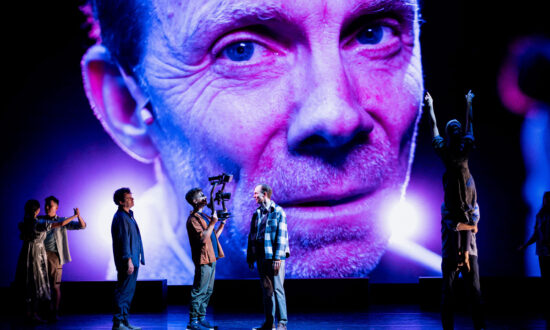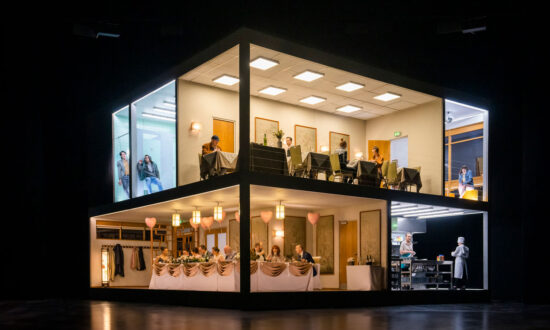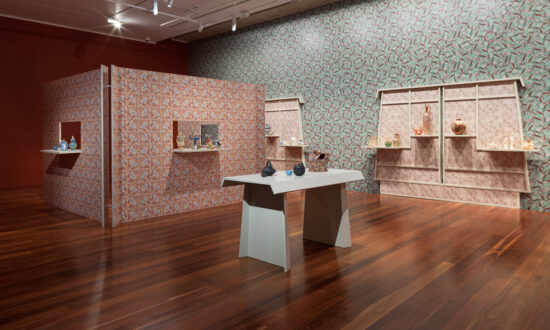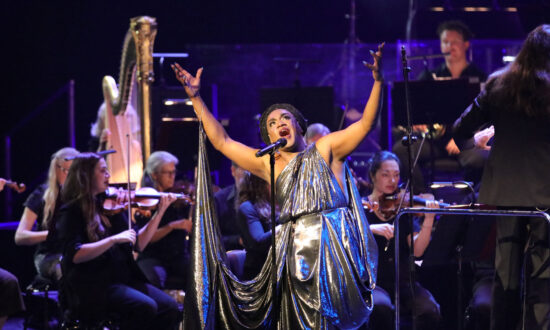The light aspects of its story, with mishaps and a play-within-a-play, offer desirable if temporary relief from some of the bad news that is about us these days. Griefs might be put aside for the three hours of a show that asks us what is dream and what is real while toying playfully with ideas of love and desire, albeit quite repressed.
Two obvious aspects of a staged operatic performance demand attention. Firstly, of course, the sound – voices and music – and, secondly, the set. Armfield’s dog features in the play, incidentally, though in a non-singing role (a hit with the audience, nonetheless).
The young and well-credentialled US counter-tenor Aryeh Nussbaum Cohen plays Oberon, King of the Fairies, and his singing is finely pitched and phrased throughout. Comments from some in the audience questioned having a counter-tenor in this role (they expected something a bit more gruff), but it’s what Britten intended.
Rachelle Durkin swishes elegantly in a long-trained gown, and her soprano is power incarnate. She has a stage presence well-suited to Tytania, Queen of the Fairies. Among the love-crossed humans, soprano Leanne Kenneally (as Helena) stands out with control and purity of tone.
Mark Coles Smith plays Puck, the narrating link rather than a singer, who acts as the energetic and engaging sprite serving Oberon. And with mostly acting rather than singing in mind, the Mechanicals are a pleasure to watch, especially when the human characters converge at the end. Warwick Fyfe as a weaver and, importantly, as the magic-afflicted Bottom earlier on, is a booming comical character in this group. Teddy Tahu Rhodes (Theseus, Duke of Athens) and Fiona Campbell (Hippolyta, Queen of the Amazons) also feature here.

Photo: Tony Lewis / Adelaide Festival
Paul Kildea conducts the Adelaide Symphony Orchestra, with the Young Adelaide Voices (as the Chorus of Fairies). The score is full of abrupt ta-da embellishments as if to ensure the listener will not miss a humorous line or to draw attention to a bit of slapstick. In that respect, it could be almost vaudevillian, the musical equivalent of a flourish in a magic show, and is a reminder of the play’s origins as a fun piece performed in the round to an audience of all kinds. The Chorus of Fairies adds vital atmosphere. Directed by Christie Anderson, their choreographed movements, voices and costumes are “enchanting”.
The set evokes a submarine world as much as a fairy dell. Constantly billowing plastic is a distraction, though it has immediate value on occasions when characters need to hide. It is meant to suggest the moving layer between worlds of dream and wakefulness. The backdrops are well-made, if lacquered in appearance. The whole effect is a bit too much of a green shower curtain rather than a natural world.
Oberon’s constant form of transport (no spoiler) is intriguing, too. The logic of it makes some sense since it conjures qualities one might associate with a fairy, but it is cumbersome and draws attention from the singing.
Thanks are due to Damien Cooper for the way that shadows and light are used so effectively; it is carefully nuanced work.
The story of A Midsummer Night’s Dream is often played with a more overt erotic edge than in this production, which is wink-wink / nudge-nudge in that regard. Why it should be so coy is hard to fathom, especially when true love and pairing off are at the heart of the plot.

Photo: Tony Lewis / Adelaide Festival
In the end, one has to ask whether this production is particularly novel and whether it is satisfying. The answer? While not especially compelling, the opera doubtless has some highlights. The singers are polished in performance and Aryeh Nussbaum Cohen is memorable.
Pitched as one of the big look-forward-to productions of the 2021 Adelaide Festival, A Midsummer Night’s Dream is indulgent and provocative. Maybe that combination is just what some opera buffs will relish.
Note: This review has been amended since publication to clarify comments regarding the casting.
A Midsummer Night’s Dream is being presented again on February 28 and March 2-3 at the Festival Theatre. It is a co-production with the Houston Grand Opera, the Lyric Opera of Chicago, and the Canadian Opera Company and Adelaide Festival, in association with Adelaide Symphony Orchestra.
Read more Adelaide Festival stories and reviews here.
Support local arts journalism
Your support will help us continue the important work of InReview in publishing free professional journalism that celebrates, interrogates and amplifies arts and culture in South Australia.
Donate Here




